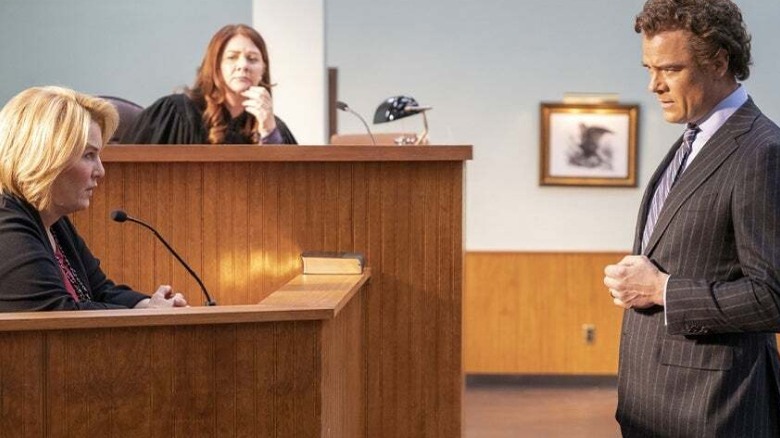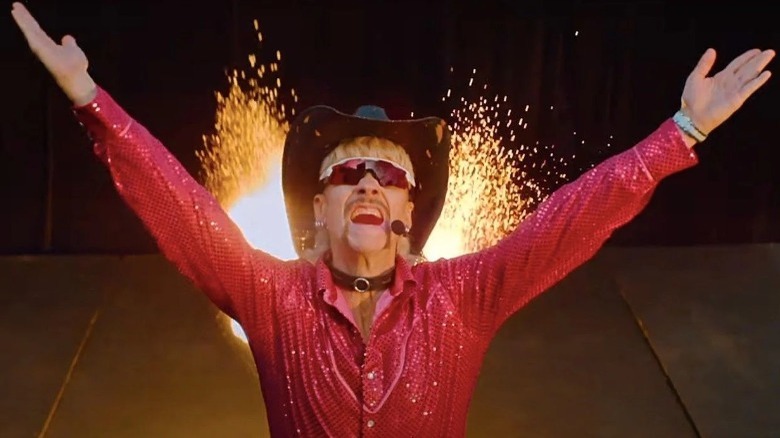Why Is Every New TV Show About Scammers?
In January, Netflix dropped a docuseries called "The Puppet Master: Hunting the Ultimate Conman." The series told the unbelievable true story of a man who posed as an MI5 agent for years in an attempt to make his romantic partners relinquish their money and power to him. Two weeks later, "The Tinder Swindler" debuted on the streamer, and debate about its testimonies by love-struck women conned out of hundreds of thousands of dollars briefly took over social media.
Two stories of swindlers is a coincidence, but three is a pattern. Just a week after "The Tinder Swindler," Netflix released "Inventing Anna," Shonda Rhimes' limited series about the bizarre, fake German heiress who scammed elite New Yorkers out of money and resources a few years ago. Netflix may have been the first streamer to get into the scammer game, but it's not the only one: over the next month, Hulu, Peacock, Apple TV+, Showtime, and NBC will all debut shows about scammers, fraudsters, or allegedly corrupt corporate figures. Ready or not, we're entering a boom period for scammer stories.
Not all grifters are created equal
The near-simultaneous occurrence of at least eight different shows about real-life scammers and corporate bad actors is strange on its own, but these shows have more than one factor in common. Four of them — "Joe vs. Carole," "The Dropout," "WeCrashed," and "The Thing About Pam" — are based on long-form investigative podcasts. Three of them (two above, plus "Super Pumped," about former Uber CEO Travis Kalanick) tell stories that touch on failed start-ups that reportedly had major ethics problems behind closed doors. A few of the shows take place far from the elite circles of Wall Street or Silicon Valley, yet still feature main characters whose money-hunger and tendency to obfuscate the truth become dangerous and even deadly.
There's also a discussion to be had about the fact that several of these scammers are white, cis, blonde women, and when they're not, their victims often are. When we look at the demographics of these stories, their central question — how did these people get away with as much as they did? — starts to have an obvious, disheartening answer: privilege. It's an answer that doubles as one frustrating explanation for my own question: why are the TV powers that be valuing these types of stories above all others?
Regardless of their commonalities, these scammers seem to exist on a broad spectrum. On one side are the white-collar grifters whose impact seems comparatively minimal, like WeWork founder Adam Neumann (played by Jared Leto in the upcoming Apple TV+ series "WeCrashed"), whose scandals mostly involved conflicts of interest and questionable methods of leadership but nonetheless led to the company's shocking failure. On the other side, there are people like Pam Hupp (played by Renée Zellweger in Peacock's "The Thing About Pam"), a seemingly average insurance agent who's now serving life in prison for murder after what appears to be a greedy and convoluted scheme gone wrong. Somewhere on the scale are people like Theranos founder Elizabeth Holmes (Amanda Seyfried in Hulu's "The Dropout"), whose long cons had far-reaching but off-screen consequences for both investors and average Americans.
America is primed for this type of story
It's easy to understand why this type of story is having a moment. America has recently emerged from a presidency that was marked by corruption, scandal, and the mind-boggling slippage of truth on a national level. In 2022, TV is offering up a smorgasbord of stories about people blatantly lying or mismanaging their power, many of whom get away with it for years thanks to their money, influence, or powers of deception. It's a therapeutic rehash of the past six years, filtered through the Mad Libs of stranger-than-fiction headlines (a fake German heiress! A Messianistic CEO! A tiger-based criminal underworld!) to make it one degree removed from our recent collective trauma. There's a reason the "He can't keep getting away with it!" reaction image from "Breaking Bad" is still so popular, and it's called the Trump presidency.
The scammer story also likely has broad bipartisan appeal, which is a thing network executives almost certainly still seek out, even if they don't say as much. In the wake of the COVID-19 pandemic, conspiracy theories have gained a scarily strong foothold in America and across the world. The people who believe their livelihoods are threatened by the corruption that's hidden in plain sight are just as likely to be validated by stories of diabolical figures being brought down (or escaping justice) as anyone else. The 21st century has ushered in a post-American dream era of society, and with it, a general distrust of everything from major corporations to one's own seemingly kindly neighbors.
There's also an obvious business sense to the scammer story wave. Podcasting is on track to become a billion-dollar industry, so it makes sense for story-hungry executives to mine popular audio networks for content ideas. The schadenfreude-based success of pre-cursors to the current scammer boom, including two Fyre Fest documentaries in 2019, likely only stoked interest in stories of this kind.
The scammer trend has an expiration date
Of course, things that make business sense don't always make narrative sense. Investigative podcasts and long-form articles work well because they're able to pull from many sources and present each one as a single panel of a panoramic story. Podcasts also pull off twists and turns that are based entirely on narration, a concept that doesn't always translate well to screen. The result of this type of adaptation is, as often as not, lacking. In NBC's "The Thing About Pam," for example, an extensive voiceover from "Dateline" narrator Keith Morrison warps the tone of the series. In "Inventing Anna," Rhimes chooses to focus each episode on a different witness to Anna's schemes, and the result is a much more redundant experience than Jessica Pressler's more holistic article for The Cut.
It's already obvious that the scammer boom has an expiration date. By the time I watched the upcoming series "The Dropout," which is perhaps the best of the bunch, I had unfortunately already grown weary of devoting hours of my life to watching people participate in denials and cover-ups over and over. As Holmes, Seyfried is utterly compelling, but it's painful to watch her character smile her way through fake demonstrations of a product designed to save lives.
Most of these shows follow a similar pattern, reveling in the messy details of their subjects' misdeeds for the majority of their runtime before finally revealing the scale of the deception to the public, with a dramatic flourish, at the last possible moment. These series serve different purposes and range in tone from funny to bleak to purely informative, but they all ask us to endure the emotionally painful narrative patterns of public and personal deception again and again. At a certain point, it's not so much entertaining as exhausting. There's a limit to how often we can question our faith in humanity, and the latest TV trend seems like it wants to push us beyond it.



